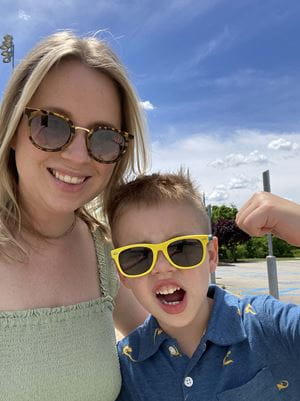For Teddy Boden’s mom, sharing their family’s story is important.
“There are so many parents with kids who have peanut and tree nut allergies so if sharing our story helps, we’ll do it,” she says.
 Teddy’s parents, Kelly and Kevin, were cautious about what they fed him from the time he was born. He had reflux as a newborn and had been flagged for milk allergies. At about a year old, they let him taste a cashew – which he spit out immediately. Within minutes, the bottom of Teddy’s face and head were red and splotchy. Their pediatrician sent them to an allergist, and he was tested at 18 months old.
Teddy’s parents, Kelly and Kevin, were cautious about what they fed him from the time he was born. He had reflux as a newborn and had been flagged for milk allergies. At about a year old, they let him taste a cashew – which he spit out immediately. Within minutes, the bottom of Teddy’s face and head were red and splotchy. Their pediatrician sent them to an allergist, and he was tested at 18 months old.
The result? Teddy tested positive to eggs, oats, milk, peanuts, and tree nuts.
“It was really scary at first,” Kelly says. “We thought, what are we going to feed this kid?”
But in talking with their allergist, Teddy’s parents learned that the test showing he was allergic to certain foods did not necessarily mean he could not eat those things – so they began to add eggs and oats back in. The allergist told them, though, to be cautious about the tree nuts and peanuts since he’d already shown a reaction to those foods.
When Teddy was just under 2 years old, they gave him a little taste of peanut butter. Immediately his tongue and mouth swelled and he indicated that his  mouth hurt. They gave him an antihistamine and decided if it got any worse that they’d go to the hospital. At that point, their local allergist told them they had an opportunity to take part in an immunotherapy trial where patients were given tiny amounts of the allergen every day, but there were a couple of caution flags for the Bodens. One, the trial was not yet approved by the U.S. Food and Drug Administration (FDA). Two, Teddy would be the youngest patient in the trial.
mouth hurt. They gave him an antihistamine and decided if it got any worse that they’d go to the hospital. At that point, their local allergist told them they had an opportunity to take part in an immunotherapy trial where patients were given tiny amounts of the allergen every day, but there were a couple of caution flags for the Bodens. One, the trial was not yet approved by the U.S. Food and Drug Administration (FDA). Two, Teddy would be the youngest patient in the trial.
The Bodens decided to wait, which was fortuitous because at this time they also moved Teddy’s allergy care to UPMC Children’s Hospital of Pittsburgh and Hey Chong, MD, PhD, chief of the Division of Allergy and Immunology.
Dr. Chong told the family that there was another immunotherapy drug option coming out soon – this one approved by the FDA – and asked if they would be interested in having Teddy participate. At this point Teddy was about 4 years old and the Bodens were starting to think about the future – a future that includes day care and eventually kindergarten, when they wouldn’t be able to control his environment. They had an appointment with Desha Jordan, MD, clinical services director of the Division of Allergy and Immunology, who talked with them about the immunotherapy drug, Palforzia.
“We could do this before he goes to kindergarten, so that he could tolerate some peanuts before he gets in that environment,” Kelly says.
 On Palforzia, children get small amounts of peanut protein every day. There is an initial build-up process that requires office visits every two weeks. At the first visit children get multiple doses of peanut to make sure they can tolerate the minimum amount of peanut required to continue treatment. The goal of Palforzia is to decrease the severity of reactions and increase the amount of peanut protein required to cause a reaction to peanut.
On Palforzia, children get small amounts of peanut protein every day. There is an initial build-up process that requires office visits every two weeks. At the first visit children get multiple doses of peanut to make sure they can tolerate the minimum amount of peanut required to continue treatment. The goal of Palforzia is to decrease the severity of reactions and increase the amount of peanut protein required to cause a reaction to peanut.
Teddy’s first Palforzia appointment lasted for six hours. For Kelly and Kevin it was scary, Kelly says, because they had been sure to not give him peanuts or tree nuts for 3-1/2 years. As it turns out, Teddy had zero reaction to the allergens. They had to return every two weeks – starting around Christmas and stopping in June.
Kelly says, “It’s hard as a working mom to do this, but it’s so worth it. I would bring my laptop and work.”
As for Teddy, she says, “We have been so fortunate. He never had a reaction. Never had a tummy ache, no hives, he never complained of anything.”
Teddy takes a powder medicine every night that they mix with yogurt or applesauce an hour before bedtime.
“He recently started kindergarten, so it made me feel a little better in case he is accidentally exposed to nuts at school,” Kelly says.
 The chances are that if Teddy is accidentally exposed to nuts, he either won’t have a reaction or, if he does, it will be a minor one.
The chances are that if Teddy is accidentally exposed to nuts, he either won’t have a reaction or, if he does, it will be a minor one.
Teddy has a little sister who’s 3; thankfully, she hasn’t shown any signs of allergies to food or other substances and nor does their stepsister, who’s 12.
Kelly says that Halloween can be a nerve-wracking experience for kids with allergies.
“You want them to go out and trick-or-treat with their friends, but you also have to be so aware of the things they’re putting in their body.”
That’s still true, but at least for the Bodens, the worry this year can be a little less.
Teddy’s treatment and results may not be representative of other similar cases.









